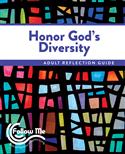
Discussion questions are available here.
 Find books, curricula, prayer, music, and worship elements (including a full sermon), and community organizations and businesses grouped to help congregations take next steps in antiracism work, creation care, and addressing intergenerational mental health and well-being in the WaterThreads - Woven Together: Water, Community, Well-Being. Available online and via requested download for member congregations - who should email: ministrylab@unitedseminary.edu - for access.
Find books, curricula, prayer, music, and worship elements (including a full sermon), and community organizations and businesses grouped to help congregations take next steps in antiracism work, creation care, and addressing intergenerational mental health and well-being in the WaterThreads - Woven Together: Water, Community, Well-Being. Available online and via requested download for member congregations - who should email: ministrylab@unitedseminary.edu - for access.
 How to Be An Anti-Racist Church
How to Be An Anti-Racist Church
Check out this free guide from Gravity Leadership with resources and links to help you and your congregation learn and grow.
 The participant's guide to Confronting Whiteness offers people of faith a new posture for addressing racial issues. Spiritual practices will help participants engage writings and films by Black authors and filmmakers and develop habits that confront and undermine the power of Whiteness. The guide was developed for groups of White people who will be led by a trained facilitator.
The participant's guide to Confronting Whiteness offers people of faith a new posture for addressing racial issues. Spiritual practices will help participants engage writings and films by Black authors and filmmakers and develop habits that confront and undermine the power of Whiteness. The guide was developed for groups of White people who will be led by a trained facilitator.
The facilitator's guide for Confronting Whiteness provides productive tools for conducting conversations with 5-10 participants. The facilitators need to have previous experience as a participant in Confronting Whiteness and a readiness to engage in the inner work necessary for transformation.
Program consists of:
 Honor God’s Diversity - God calls us to honor diversity that God has created in our world by diving deep beyond just accepting diversity. When we recognize and celebrate the different gifts, abilities, and voices in all creation, we honor the diversity in the world God has created.
Honor God’s Diversity - God calls us to honor diversity that God has created in our world by diving deep beyond just accepting diversity. When we recognize and celebrate the different gifts, abilities, and voices in all creation, we honor the diversity in the world God has created.
With age-specific and intergenerational/full congregation curriculum available (click here and scroll down).
 'Trouble the Water’ docuseries available to download
'Trouble the Water’ docuseries available to download
Abbey of the Arts' Lift Every Voice book club will explore I'm Still Here: Black Dignity in a World Made for Whiteness by Austin Channing Brown. Watch the video conversation, join the Facebook group, and/or participate in the mid-month Zoom conversation. Begins Friday, August 20th, 2021.
What Is Critical Race Theory and What Christians Should Know
includes:
Reason to Have Hope: A Public Health Response to Racism — a multi-part, online, interactive, and highly adaptable course created by the UCC's CHHSM — is now online. The innovative, user-friendly curriculum is geared for a group learning environment, and includes history, current events, theology, stories of resilience, and the intersections of race and social issues to help members of faith-based organizations and local churches learn from not only the material, but each other.
Vanderbilt Divinity School offers this continuing series of diverse thinkers discussing the reality and implications of racial capitalism.
 “Wakanda Forever” offers a beautiful and unsatisfying story
“Wakanda Forever” offers a beautiful and unsatisfying storyBy Brooke Scott
|
Padraig O Tuama reads Meleika Gesa-Fatafehi's poem, Say My Name and discusses it's ramifications for personal history, identity, belonging and awareness - and the many ways these can be stripped by people who dismiss or mispronounce other's names.
And Who Is My Neighbor?: Talking about Race and Racial Equity from Lutheran Social Services: Study Guide & Leader Guide
CONVERGENCE offers two webinars on-demand:
SURJ is a volunteer-led organization that provides online resources as well as trained speakers for group learning. Their online material is appropriate for youth through adults.
RACIAL EQUITY RESOURCE DIRECTORY from Minnesota Compass is a listing of racial equity programs and training providers serving workplaces, civic organizations, educational institutions, faith communities, and anyone working to combat racism and increase cultural competence.
has numerous opportunities for personal growth, new learning and more, including:
Abolitionist Teaching Network's mission is: develop and support educators to fight injustice within their schools and communities. Utilizing the intellectual work and direct action of Abolitionists in many forms, they organize and take action for educational freedom. Among other amazing opportunities, you can:
 |
Addiction & Race: Generations of Trauma |
Addiction and drug policy in America are inextricably linked to race. Sam Simmons, an Alcohol and Drug Counselor specializing in the areas of Anger Management, Chemical Dependency, and Pain Management and working with the African American community leads this free, one-hour seminar, which dives into the dynamics of racial injustice, trauma and oppression that contribute to addiction rates and looks at the ongoing racial disparities in policing and incarceration that perpetuate inequality, failing to address the root causes of addiction and the potential negative consequences of drug use.